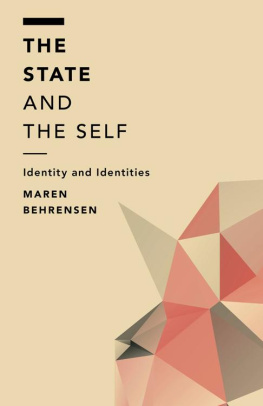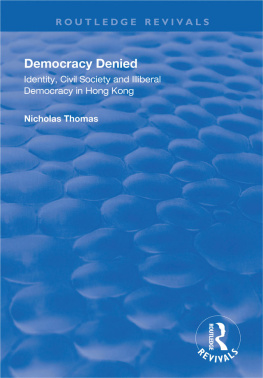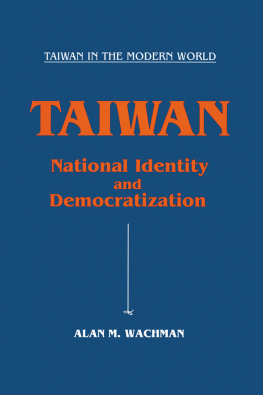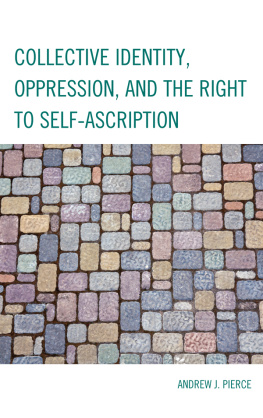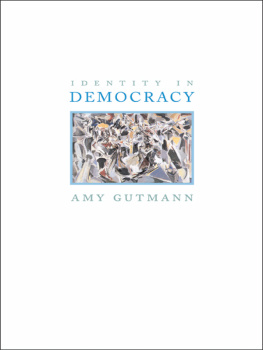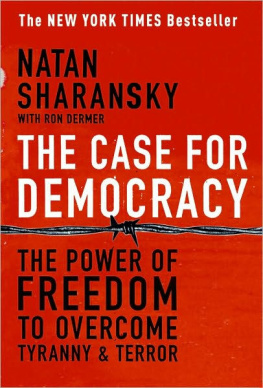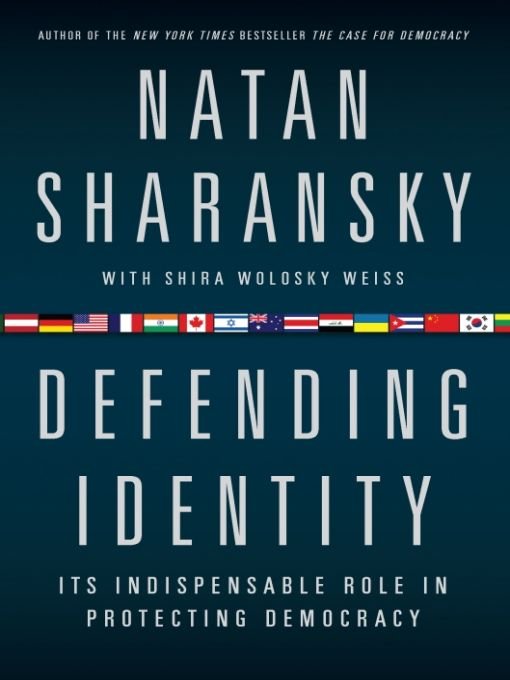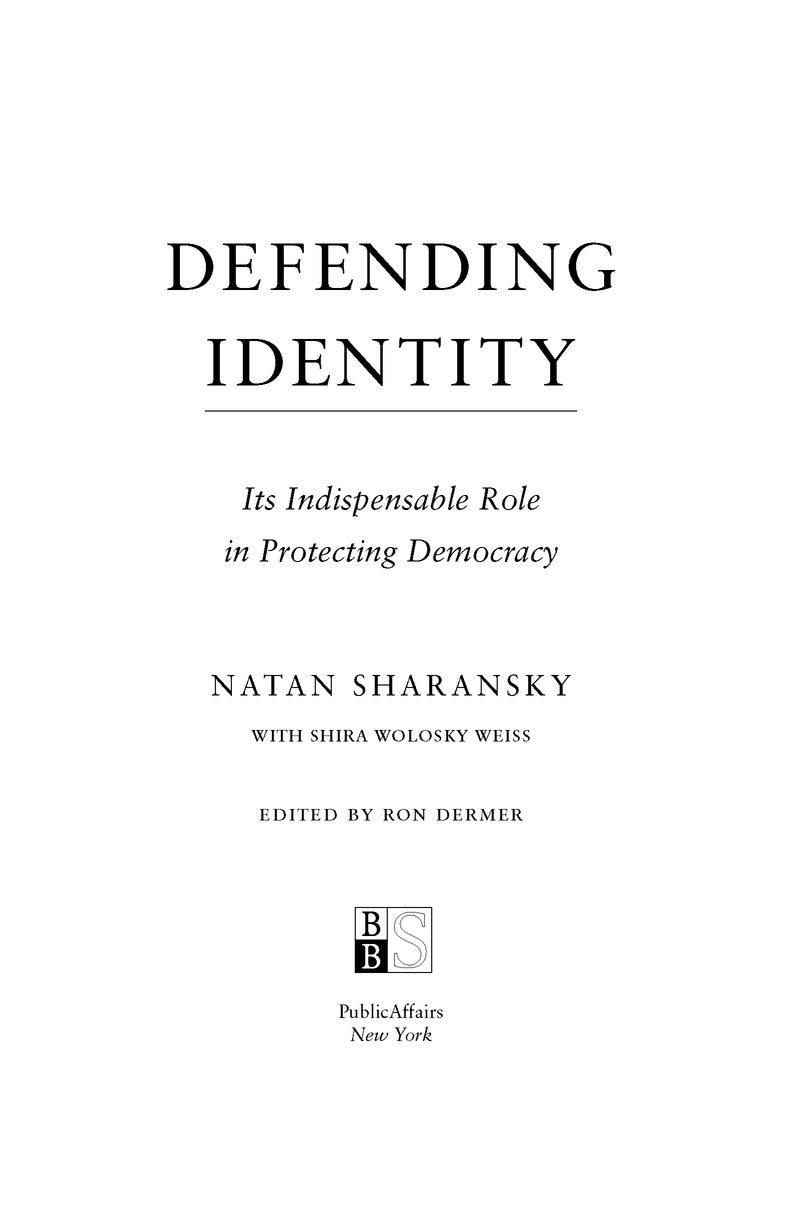Table of Contents
ALSO BY NATAN SHARANSKY
Fear No Evil
The Case for Democracy
with Ron Dermer
To our children
PREFACE
MY ADULTLIFE can be divided into three almost equal parts. First, I was a loyal Soviet citizen, a doublethinker who tried to adapt to and succeed inside a totalitarian regime. Then I became a dissident and ultimately a political prisoner. Finally, since 1986 I have been involved in public and political life in the free world, including almost a decade as a member of parliament and as a cabinet minister in four Israeli governments.
This is my third book, though I never considered myself a writer. I write when I feel that sharing my combined experiences from the dramatically different phases of my life might advance the causes I believe in and help others in their struggle for freedom.
My prison memoir, Fear No Evil, was written immediately after my release from nine years in the Gulag. The point of pouring onto paper all the stories from my years as a dissident and a prisoner was to remind everyonebut most of all those who remained trapped behind the iron curtainhow deep are the inner resources that each of us has when we defend our right to be free. I wanted to strengthen the spirits and the hopes of the people left behind.
My second book, The Case for Democracy, was written after nearly twenty years in public and political life. In these years the great victory of the free world in the Cold War had been followed by a period when the same free world seemed to want to disarm itself of the most potent weapon in its arsenal: freedom itself. The book was an appeal to democratic political leaders of every party and perspective to appreciate the power of freedom. With the perspective gained from being both a democratic dissident and a politician, I desperately wanted to explain why and how the democratic world can mobilize freedom to overcome the forces of tyranny and terror.
Still, I recognize that the power of freedom alone is insufficient to the task today. For while the democratic world has at its disposal the system that is best able to use the talents and energies of its citizens and as a result has vastly superior material resources, the enemy possesses a strong will.
The enemys will is strong because his identity is strong. And we must match his strength of purpose with strong identities of our own.
In thinking about the challenges facing the democratic world in building strong identities, I soon discovered that precious few people in the West see identity as a friend of freedom. On the contrary: Identity is regarded by an increasing number of intellectuals and public figures as an antagonist to freedom, as a source of conflict, and as a threat to peace.
Yet the idea of a pitched battle between the forces of freedom and the forces of identity is entirely alien to me. I can read books and articles suggesting it is true. I can hear eloquent rationalizations explaining why it is true. But I know it is false. Not only are strong identities vitally important to individuals who hope to lead a life of purpose, they are essential for the ability of a democratic nation to defend its cherished freedoms. Far from being enemies, freedom and identity are staunch allies in the struggle against evil. That is the main message of Defending Identity, the message that I believe is important for every individual, every group, and every nation in the free world.
Over time I have come to understand that the notion of identity and democracy as allies is so obvious to me because I had an experience long ago that left an indelible mark on my view of freedom, my view of identity, and my view of the connection between them.
In the books I have written, I have drawn deeply on the experiences of my years in prison. I have done so not because I am under any illusion that the unique circumstances of prison life are easily transferable to the outside world but rather because I believe that those years in the Gulag afforded me a once-in-a-lifetime laboratory to discover first principles that put a bright spotlight on challenges and confusions that face the world. The lessons of the Gulag are stark but also very clear.
My years in the Gulag convinced me of this powerful alliance between freedom and identity. This is not to say that I never feel any tension between themonly that I recognized long ago that freedom and identity stand on the same side of a great moral divide and nothing I have seen or experienced since has convinced me otherwise. In fact in all my adult life I have doubted this truth for only a single day, and that was many, many years agoin February 1977...
For dissidents in the Soviet Union during the 1960s and 1970s, telephone conversations with their comrades-in-arms abroad were like the light of a lamp on a dark street. It was a joyful reminder that despite all the efforts of the KGB, we were not alone. For me, the unofficial spokesman of two movementsthe Jewish immigration movement and the movement for human rightsan important part of my activities took place on the telephone. Speaking very quickly before being disconnected, I dictated appeals from Jewish activists demanding freedom of immigration or Andrei Sakharovs appeals to the president of the United States to press the Soviet regime to release prisoners of conscience. As words from our dissident underground moved to the international stage, I could feel them gaining strength, amplifying the voices of their authors as they traveled across the oceans. And as information trickled back about what was happening in the worlds parliaments from friends who had been fighting with us and who were determined to continue our common struggle, we felt that nothing could stop us.
The KGB understood the importance of controlling the lines of communication. That is why there was no direct dialing abroad. Telephone conversations were often jammed, and those telephones that were suspected of being frequently used for illegal calls were often simply disconnected. But with inventiveness and stubbornness we would restore our connections, informing our contacts in advance, often through tourists, about where and when and under what name we would be waiting for the next call. And each telephone call brought one more injection of encouragement, energy, and enthusiasm.
Especially precious to me were conversations with my wife, Avital, from whom I had been separated since the day after our marriage. She never abandoned the struggle for our reunion, not even for a single day. But our telephone conversation in the middle of February 1977 was exceptional. After it I felt like a balloon from which the air had been taken out.
It was a difficult time for all the dissidents of the Soviet Union. The Helsinki group created in April 1976 had been publishing dozens of documents about the Soviet Unions failure to fulfill its obligations on human rights under the Helsinki Accords. This had attracted the attention of the entire world. And, exactly as the founders of the group expected, at the beginning of February the repression started. Two leaders of the group, Yuri Orlov and Alexander Ginsburg, were arrested. A third central figure, Ludmilla Alexeyeva, was forced to leave the Soviet Union. I, as the unofficial spokesman of this group, was the next central activist in line to be arrested. At the same time, the Jewish immigration movement, which was more massive than any other dissident group and more specific in its single fundamental demand that Jews should be allowed to leave, was also under strong attack. For the previous two years we had established an unbelievable level of international recognition. Official delegations of senators and congressmen were meeting with us before they went on to summits with Brezhnev and other Soviet leaders. In Washington, D.C., our voice in support of the Jackson Amendment, which linked American trade with freedom of immigration from the USSR, proved to be stronger than the voice of the Nixon administration, which tried to circumvent it. Direct TV reports, taped in Moscow, of interviews with refuseniksJews who had been denied exit visasand coverage of their activity began to appear on Western screens. (All these events would later become part of the accusations against me of high treason.) Such obvious and powerful dissident activity bewildered the KGB and in the beginning of the winter they began their counterattack. Articles and TV programs about Zionist betrayers of the motherland became more and more threatening. In the official film


